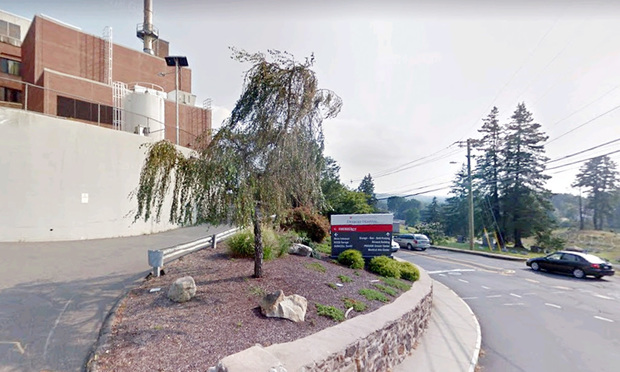Danbury Jury Awards $2.7 Million to Estate of Cancer Patient Misdiagnosed With Inflamed Pancreas
"Joseph Ingram talked of how he and his wife used to sit on the porch on the rocking chair together and watch the sun go down," said Steven Errante, attorney for the estate of Gail Ingram. "Now, that chair is empty."
January 24, 2019 at 06:38 PM
4 minute read
 Danbury Hospital, 24 Hospital Ave., Danbury. Courtesy photo
Danbury Hospital, 24 Hospital Ave., Danbury. Courtesy photo
A Danbury Superior Court jury Wednesday awarded $2.7 million to the family of a woman who died from lung cancer after allegedly being misdiagnosed with inflammation of the pancreas.
Following a two-week trial, the six-person jury deliberated for two and a half days before rendering its verdict in favor of the estate of Gail Ingram.
The jury in the medical malpractice case heard testimony that Dr. Barbara Blanco, who worked as a radiologist for Danbury Radiological Associates, botched the interpretation of a September 2012 test that showed Ingram had a suspicious one-centimeter nodule on the base of her right lung. It heard that Blanco instead told Ingram she had an inflammation of the pancreas. That was the only finding Blanco gave Ingram, who died in June 2014, less than two years after the misdiagnosis.
Ingram's relatives filed an amended lawsuit last December.
“Part of our theory is that she got tired, overworked and careless. She committed malpractice in this case,” said Steven Errante, a partner with New Haven's Lynch, Traub, Keefe & Errante and one of the Ingram estate's two attorneys on the case.
Blanco, now a radiologist for the Carmel, New York, branch of CareMount Medical, did not immediately respond to a request for comment Thursday. In court filings, the defense said any allegations of malpractice on the part of Blanco would have to be proved by the plaintiffs.
“We believe it came down to a radiologist having to view approximately 15,000 images per day, and that is from her own testimony,” Errante said Thursday. “This cancer appeared on three to nine images. We think she missed it because of the amount of work she was required to do on a daily basis.”
The next time Ingram appeared at Danbury Hospital was in April 2014 when she complained of abdominal pain, according to the lawsuit. That visit was 19 months after Blanco allegedly missed the opportunity for a diagnosis, plaintiff counsel said.
“By this time, that suspicious nodule had turned into a four-centimeter metastasized mass,” Errante said.
Ingram was officially diagnosed with large-cell neuroendocrine, a type of lung cancer, on May 7, 2014. The 61-year-old died June 12, 2014.
Errante said if Ingram had been properly diagnosed in 2012, she “would have had the lower lobe of her right lung removed right away and she would have had chemotherapy.”
Dr. Paul Bader, a New York University oncologist and one of the plaintiff's experts, testified at trial that a proper diagnosis would have given Ingram a 70 percent to 88 percent chance of survival.
It's up to defense attorneys to decide whether to appeal the verdict to the Connecticut Appellate Court, and Errante expects them to do so.
Rich Tynan and Tim Grady, attorneys with Hartford's Halloran & Sage, represent Blanco and DRA. Neither attorney responded to a request for comment Thursday.
Errante said Ingram's widower, Joseph, and their two children testified at trial.
“I think what swayed the jury was a combination of the testimony of our experts and the testimony of the husband,” Errante said. “There was tremendous sympathy for him and their two children. Joseph Ingram talked of how he and his wife used to sit on the porch on the rocking chair together and watch the sun go down. Now, that chair is empty.”
Also testifying for the plaintiff was radiologist Kyunghee Cho of New York University, who, Errante said, told jurors that the images of the suspicious nodules “would have required reporting and further investigation.”
Before trial, Errante made a demand for $1.8 million. The defense did not make a counteroffer. “I was very surprised by that,” Errante said.
Assisting Errante was his colleague, partner Marisa Bellair.
This content has been archived. It is available through our partners, LexisNexis® and Bloomberg Law.
To view this content, please continue to their sites.
Not a Lexis Subscriber?
Subscribe Now
Not a Bloomberg Law Subscriber?
Subscribe Now
NOT FOR REPRINT
© 2025 ALM Global, LLC, All Rights Reserved. Request academic re-use from www.copyright.com. All other uses, submit a request to [email protected]. For more information visit Asset & Logo Licensing.
You Might Like
View All
Apple Disputes 'Efforts to Manufacture' Imaging Sensor Claims Against iPhone 15 Technology

Patent Disputes Over SharkNinja, Dyson Products Nearing Resolution
Trending Stories
- 1DOT Nominee Duffy Pledges Safety, Faster Infrastructure Spending in Confirmation Hearing
- 2'Younger and Invigorated Bench': Biden's Legacy in New Jersey Federal Court
- 3'Every Single Judge on Board': First-Impression Case Revived
- 4NYSBA Annual Meeting: How In-House Counsel Navigate Gen AI Risk
- 5A Judge Ordered Squabbling Lawyers to Have Lunch: Here's What Happened
Who Got The Work
J. Brugh Lower of Gibbons has entered an appearance for industrial equipment supplier Devco Corporation in a pending trademark infringement lawsuit. The suit, accusing the defendant of selling knock-off Graco products, was filed Dec. 18 in New Jersey District Court by Rivkin Radler on behalf of Graco Inc. and Graco Minnesota. The case, assigned to U.S. District Judge Zahid N. Quraishi, is 3:24-cv-11294, Graco Inc. et al v. Devco Corporation.
Who Got The Work
Rebecca Maller-Stein and Kent A. Yalowitz of Arnold & Porter Kaye Scholer have entered their appearances for Hanaco Venture Capital and its executives, Lior Prosor and David Frankel, in a pending securities lawsuit. The action, filed on Dec. 24 in New York Southern District Court by Zell, Aron & Co. on behalf of Goldeneye Advisors, accuses the defendants of negligently and fraudulently managing the plaintiff's $1 million investment. The case, assigned to U.S. District Judge Vernon S. Broderick, is 1:24-cv-09918, Goldeneye Advisors, LLC v. Hanaco Venture Capital, Ltd. et al.
Who Got The Work
Attorneys from A&O Shearman has stepped in as defense counsel for Toronto-Dominion Bank and other defendants in a pending securities class action. The suit, filed Dec. 11 in New York Southern District Court by Bleichmar Fonti & Auld, accuses the defendants of concealing the bank's 'pervasive' deficiencies in regards to its compliance with the Bank Secrecy Act and the quality of its anti-money laundering controls. The case, assigned to U.S. District Judge Arun Subramanian, is 1:24-cv-09445, Gonzalez v. The Toronto-Dominion Bank et al.
Who Got The Work
Crown Castle International, a Pennsylvania company providing shared communications infrastructure, has turned to Luke D. Wolf of Gordon Rees Scully Mansukhani to fend off a pending breach-of-contract lawsuit. The court action, filed Nov. 25 in Michigan Eastern District Court by Hooper Hathaway PC on behalf of The Town Residences LLC, accuses Crown Castle of failing to transfer approximately $30,000 in utility payments from T-Mobile in breach of a roof-top lease and assignment agreement. The case, assigned to U.S. District Judge Susan K. Declercq, is 2:24-cv-13131, The Town Residences LLC v. T-Mobile US, Inc. et al.
Who Got The Work
Wilfred P. Coronato and Daniel M. Schwartz of McCarter & English have stepped in as defense counsel to Electrolux Home Products Inc. in a pending product liability lawsuit. The court action, filed Nov. 26 in New York Eastern District Court by Poulos Lopiccolo PC and Nagel Rice LLP on behalf of David Stern, alleges that the defendant's refrigerators’ drawers and shelving repeatedly break and fall apart within months after purchase. The case, assigned to U.S. District Judge Joan M. Azrack, is 2:24-cv-08204, Stern v. Electrolux Home Products, Inc.
Featured Firms
Law Offices of Gary Martin Hays & Associates, P.C.
(470) 294-1674
Law Offices of Mark E. Salomone
(857) 444-6468
Smith & Hassler
(713) 739-1250












